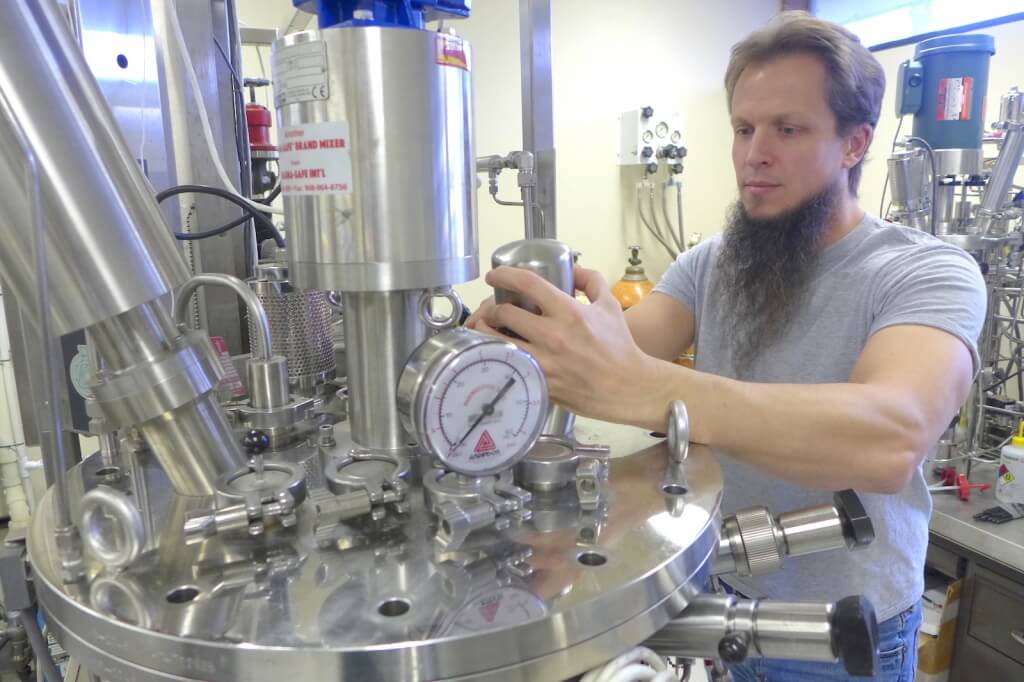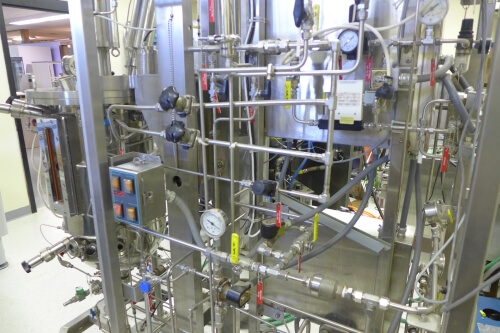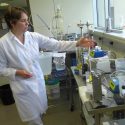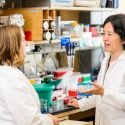Small-scale protein production a big business for UW spinoff
It’s only a slight oversimplification to say that making proteins is the entire job of the DNA that comprises our chromosomes.
Proteins form complex structures. They make enzymes that catalyze chemical reactions, form structural components of cells, serve as transporters that move various molecules around inside cells.
In the context of biotechnology — where useful proteins are conjured in the lab — a big problem, Fritz Schomburg says, is that proteins misbehave. They fail to form in the fermenter or, more often, fold the wrong way, making them unusable and unsalable. It may take some tweaking, but eventually, Schomburg’s firm, Lytic Solutions, figures out how to brew and purify the required quantity of the correctly folded protein, and ships it to his customers.

Fritz Schomburg, founder of Lytic Solutions in Madison, with one of the firm’s fermenters, where bacteria grow and produce protein for use by pharmaceutical firms or customers in the biomedical industry. Photo: David Tenenbaum
One important group of synthesized proteins — antibodies — is created in nature by the immune system. Science has harnessed lab-made antibodies for use in diagnosis and therapy, and Lytic specializes in making antibodies and the proteins required to purify them.
Proteins can take millions of possible configurations, and although Schomburg says making proteins is a “craft,” it’s a very 21st century craft, as proteins are at the center of advanced biomedical research and treatment. For example, when antibodies to cancer cells are joined to toxic compounds, the antibodies connect to the tumor and precisely deliver the toxin while sparing healthy cells.
According to a 2015 study, the world market for monoclonal (identical) antibodies is expected to grow from $75 billion in 2013 to $125 billion in 2020.
In some ways, Lytic is a typical UW-Madison spinoff: Biology and especially biochemistry have spawned a wide range of commercial successes. But unlike many young biotech spinoffs, it earns its income not from federal research grants, but from shipping product.

Feed ports, valves, gauges and apparatus needed to control the fermenter at left. Photo: David Tenenbaum
Proteins are extremely difficult and costly to synthesize using chemistry lab techniques, but bacteria that have been genetically altered to do the job in six fermentation vessels that litter Lytic labs in an unprepossessing building on Madison’s south side.
Growing bacteria to make protein is not quite as simple as dumping yeast (a different type of microbe) into warm, sugary water to make bread. Each fermenter is heavily plumbed with tubing carrying water, sugar or other nutrients. It is hooked up to computers, sensors, controls, pumps and heating or cooling circuits that start the reaction and then siphon off the heat created by the feverish growth of bacteria.
Once mature, the bacterial cells must be broken apart before the protein is purified, analyzed, packaged and shipped to the customer in portions ranging from less than a millionth of a gram to a kilogram or so.
Finding customers is not difficult for a firm that comes through on its promises, Schomburg says. “Most of our business comes from repeat clients, who understand you are going to do what you told them you would do. If we can’t, we thoroughly explain the issues and work with clients to retool the protein to produce an effective replacement for their needs.”
In some ways, Lytic is a typical UW–Madison spinoff: Biology and especially biochemistry have spawned a wide range of commercial successes. But unlike many, it earns its income from shipping product.
Schomburg learned to make proteins while getting a Ph.D. in the lab of UW–Madison biochemistry Professor Richard Amasino, which was exploring the genes and proteins that govern the “switch” that causes a plant to start flowering. Then he grew fascinated by art glass. While getting a master of fine arts degree at the UW, he invented combinations of pigments that cause glass to change colors in different light, and embarked on a brief career as a glass sculptor. At home, he grew orchids for shipment around the world — until his landlord had other ideas.
Tiring of glass and orchids, Schomburg returned to proteins and started Lytic Solutions, where he works alongside two fellow Ph.D.’s, in 2009. Producing protein was a logical career move for someone who likes a challenge, he says.
“Every project is new and different, and it can be frustrating, but when something is solved, it’s cathartic. If it’s too easy, it’s boring. If it’s too difficult, you will never achieve anything. But if it’s hard enough, and still solvable, that’s wonderful.”
Tags: biotechnology, DNA, research, spinoffs



